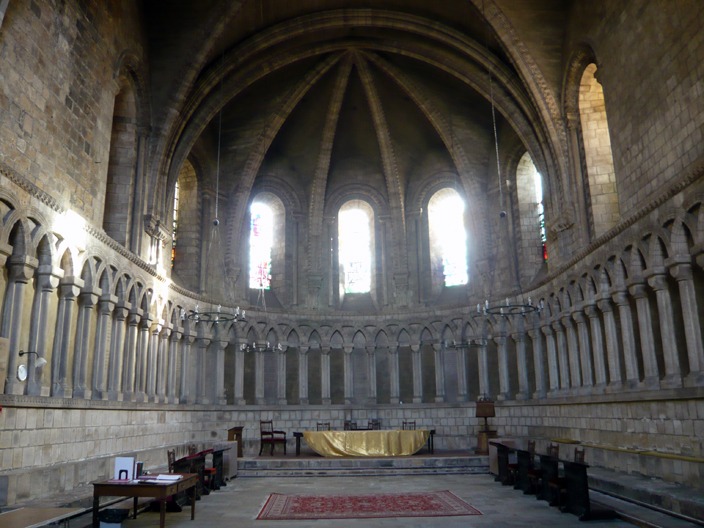 One of the composers with a significant birthday this year is the Italian Claudio Monteverdi, born 450 years ago, so it’s both inevitable and delightful that his music is around in abundance this year. David Stancliffe’s performance last night in the cathedral Chapter House of Monteverdi’s great 1610 Vespers was particularly well timed for me, coming at the beginning of the choir summer break and just after our own first two rehearsals of the Vespers for October. It was good to put the score down, to listen, and absorb the whole work.
One of the composers with a significant birthday this year is the Italian Claudio Monteverdi, born 450 years ago, so it’s both inevitable and delightful that his music is around in abundance this year. David Stancliffe’s performance last night in the cathedral Chapter House of Monteverdi’s great 1610 Vespers was particularly well timed for me, coming at the beginning of the choir summer break and just after our own first two rehearsals of the Vespers for October. It was good to put the score down, to listen, and absorb the whole work.
David Stancliffe brings musicians together under the name The Bishop’s Consort, usually a mixture of experienced and younger musicians, singers and instrumentalists; a more informal and ad hoc version of some of the other mentoring programmes that exist, and it was good to see some former Durham students returning as their careers develop, as well as several of the current cathedral choral scholars.
This evening’s Vespers was essentially one singer per part, with a few extra for the larger choruses. Of the psalm movements, I particularly enjoyed the brisk, purposeful Nisi Dominus, and the effective interplay between the two choirs in both this, and Lauda Jerusalem. By contrast, Dixit Dominus, the first psalm began quite gently and prayerfully, creating musical space but without any great pomp; this movement and, somewhat surprisingly, the opening response, the famous Deus in Adjutorium, were reminders that the Vespers were written before Monteverdi made his move to Venice, and therefore don’t need to be performed in a massive space. It was the gentler parts of the choruses that worked best in the cathedral Chapter House: in some of the Glorias, the singers grew too much for the room’s huge acoustic, and some of the details were lost.
Another part of the gentleness in this performance came from David Stancliffe’s decision to follow current thinking about the relationships between the duple and triple times (forgive me, I’ve heard a lot about this in recent weeks), adopting a slower triplet than what we may be used to from some of the most famous recordings. It was very good to hear this from the audience instead of whilst being in the middle of the music and sight-reading; the slower triple beats transformed parts that are often a frenetic gallop into something much more tender.
In between the psalms came some extremely enjoyable solo singing, Sopranos Laura Baldwin and Miranda Ostler brought the intimacy of madrigal singing to Pulchra Es, particularly in the flowing lines towards the end. The tenor voices of Hugo Hymas and Phillipe Durant entwined together exquisitely in Duo Seraphim with those dissonances that capture the terrible fierce beauty of the angelic beings, and after Hugo Hymas’s haunting opening to Audi Coeli, with Hector Sequera matching him for resonance on the lower strings of the theorbo, the faster notes seemed to tumble out in an unstoppable rush.
The real highlight of the evening though, one of those musical moments that will stay with me for a long time, was Hugo Hymas and Hector Sequera’s performance of Nigra Sum. The singing was thoughtful and tender, drifting gently up to the higher notes and some heavenly little ornaments at the end, with the theorbo adding gentle touches of colour. It was definitely one of those moments when time stood still.
The last few movements of the Vespers are specifically concerned with praising the Virgin Mary, and it’s in these movements that we get to enjoy more orchestral colours: I much enjoyed the sweet lightness of Morag Johnson and Miranda Dodd’s dancing violins in Sancta Maria, and their violin duet later in the Magnificat was beautifully expressive. Other effective pairings in the Magnificat were Philippe Durant’s poised Quia respexit with the lovely mellow sound of the sackbuts, and the sustained line of the two countertenors Lewis Cullen and David Boer alternating with the dancing cornetts in Esurientes.
After a fittingly glorious start to the Gloria led by Hugo Hymas and echoed by Philippe Durant, whilst the two sopranos calmly threaded their way through the middle, I enjoyed the tranquility of Hector Sequera’s theorbo in the quieter passages before all forces joined together in the final blaze of glory. This performance didn’t end there though: after the echoes of the Magnificat final Amen had died away, the singers and orchestra joined together in a simple plainchant Salve Regina, which made for a prayerful and very moving end to the evening.








